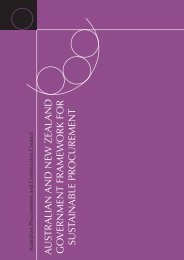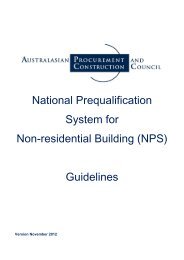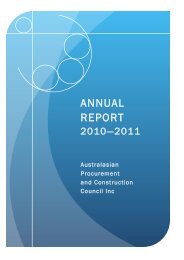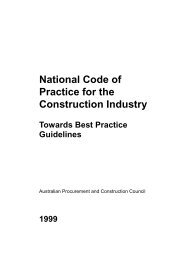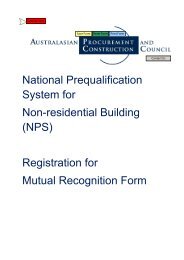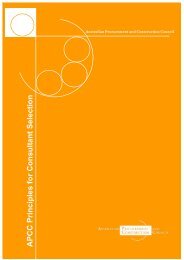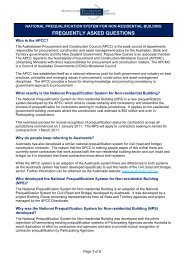Improving Security of Payment Building and Construction Industry
Improving Security of Payment Building and Construction Industry
Improving Security of Payment Building and Construction Industry
- No tags were found...
Create successful ePaper yourself
Turn your PDF publications into a flip-book with our unique Google optimized e-Paper software.
4. Trusts Page 44National Public Works Council Inc<strong>Improving</strong> <strong>Security</strong> <strong>of</strong> <strong>Payment</strong> in the <strong>Building</strong> <strong>and</strong> <strong>Construction</strong> <strong>Industry</strong>• Liquidation• Bankruptcy• Deed <strong>of</strong> AssignmentThe issue <strong>of</strong> preferential payment does not apply to Receivership <strong>and</strong> accordingly, aReceiver does not have recourse to such a payment.Briefly, a preferential payment is voidable against the Liquidator or Trustee inBankruptcy, ie the Liquidator or Trustee in Bankruptcy will have recourse against thepayment. Preferential payments are governed by Section 565 <strong>and</strong> 588FA, FC <strong>and</strong> FE<strong>of</strong> the Corporations Law <strong>and</strong> Section 122 <strong>of</strong> the Bankruptcy Act.Basically, the above provisions apply if:(i)(ii)(iii)a debtor <strong>and</strong> creditor are parties to a transaction;the transaction results in the creditor receiving payment for an unsecured debt,more than the creditor would receive from the debtor if the transaction was setaside <strong>and</strong> the creditor was to prove for the debt in a Liquidation/Bankruptcy <strong>of</strong>the debtor; <strong>and</strong>the transaction occurred within the relevant time period to be classified as apreference payment.The transaction would be considered a preference payment even if the transaction wasentered into because <strong>of</strong> an Order <strong>of</strong> an Australian Court, a direction <strong>of</strong> an agency orpursuant to the terms <strong>and</strong> conditions <strong>of</strong> legislation (not including the CorporationsLaw or Bankruptcy Act).A Liquidator or a Trustee in Bankruptcy is entitled to void the payment only if thetransaction involved the dissipation <strong>of</strong> assets which would otherwise have vested asassets in the Liquidation or Bankruptcy <strong>and</strong> the beneficiary was a creditor.It is well settled that if property was held on trust <strong>and</strong> a repayment was afforded to abeneficiary or claimant prior to either Liquidation or Bankruptcy, such a transactionwould not be considered a preference (under either Section 565 or 588FA <strong>of</strong> theCorporations Law or Section 122 <strong>of</strong> the Bankruptcy Act), as the claimant orbeneficiary is not a creditor.The above assumes that the trust arrangement is embodied within the tradingactivities <strong>of</strong> the corporate trustee. This is the basis on which we have considered theuse <strong>of</strong> trusts by a corporate trustee to afford security to the Subcontractors. Theproposition can be different if the company was acting as trustee under a trading trustarrangement <strong>and</strong> in certain circumstances, the monies are recoverable as voidabledispositions. However, this is considered outside the scope <strong>of</strong> this Consultancy <strong>and</strong>we make no further comment.4.8.6 What rights does a liquidator (or Trustee) have to monies:


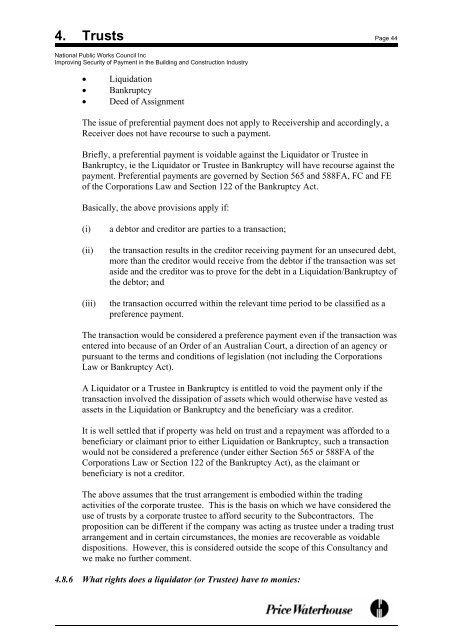
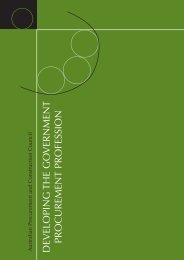
![NATIONAL COST ADJUSTMENT PROVISION EDITION 2 [NCAP2]](https://img.yumpu.com/48266135/1/184x260/national-cost-adjustment-provision-edition-2-ncap2.jpg?quality=85)

